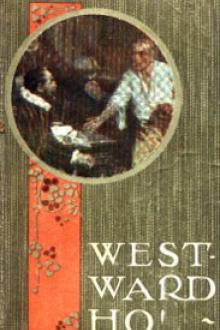Westward Ho! Or, The Voyages and Adventures of Sir Amyas Leigh, Knight, of Burrough, in the County of Devon, in the Reign of Her Most Glorious Majesty Queen Elizabeth by - (acx book reading .TXT) 📖

- Author: -
Book online «Westward Ho! Or, The Voyages and Adventures of Sir Amyas Leigh, Knight, of Burrough, in the County of Devon, in the Reign of Her Most Glorious Majesty Queen Elizabeth by - (acx book reading .TXT) 📖». Author -
“Amyas! Amyas!” said Frank; “you must not throw away the hopes of years, and for me, too! Oh, how just was your parable! Ah! mother mine! to what use is all my scholarship and my philosophy, when this dear simple sailor-lad outdoes me at the first trial of courtesy!”
“My children, my children, which of you shall I love best? Which of you is the more noble? I thanked God this morning for having given me one such son; but to have found that I possess two!” And Mrs. Leigh laid her head on the table, and buried her face in her hands, while the generous battle went on.
“But, dearest Amyas!—”
“But, Frank! if you don't hold your tongue, I must go forth. It was quite trouble enough to make up one's mind, without having you afterwards trying to unmake it again.”
“Amyas! if you give her up to me, God do so to me, and more also, if I do not hereby give her up to you!”
“He had done it already—this morning!” said Mrs. Leigh, looking up through her tears. “He renounced her forever on his knees before me! only he is too noble to tell you so.”
“The more reason I should copy him,” said Amyas, setting his lips, and trying to look desperately determined, and then suddenly jumping up, he leaped upon Frank, and throwing his arms round his neck, sobbed out, “There, there, now! For God's sake, let us forget all, and think about our mother, and the old house, and how we may win her honor before we die! and that will be enough to keep our hands full, without fretting about this woman and that.—What an ass I have been for years! instead of learning my calling, dreaming about her, and don't know at this minute whether she cares more for me than she does for her father's 'prentices!”
“Oh, Amyas! every word of yours puts me to fresh shame! Will you believe that I know as little of her likings as you do?”
“Don't tell me that, and play the devil's game by putting fresh hopes into me, when I am trying to kick them out. I won't believe it. If she is not a fool, she must love you; and if she don't, why, be hanged if she is worth loving!”
“My dearest Amyas! I must ask you too to make no more such speeches to me. All those thoughts I have forsworn.”
“Only this morning; so there is time to catch them again before they are gone too far.”
“Only this morning,” said Frank, with a quiet smile: “but centuries have passed since then.”
“Centuries? I don't see many gray hairs yet.”
“I should not have been surprised if you had, though,” answered Frank, in so sad and meaning a tone that Amyas could only answer—
“Well, you are an angel!”
“You, at least, are something even more to the purpose, for you are a man!”
And both spoke truth, and so the battle ended; and Frank went to his books, while Amyas, who must needs be doing, if he was not to dream, started off to the dockyard to potter about a new ship of Sir Richard's, and forget his woes, in the capacity of Sir Oracle among the sailors. And so he had played his move for Rose, even as Eustace had, and lost her: but not as Eustace had.
CHAPTER V CLOVELLY COURT IN THE OLDEN TIME “It was among the ways of good Queen Bess, Who ruled as well as ever mortal can, sir, When she was stogg'd, and the country in a mess, She was wont to send for a Devon man, sir.” West Country Song.
The next morning Amyas Leigh was not to be found. Not that he had gone out to drown himself in despair, or even to bemoan himself “down by the Torridge side.” He had simply ridden off, Frank found, to Sir Richard Grenville at Stow: his mother at once divined the truth, that he was gone to try for a post in the Irish army, and sent off Frank after him to bring him home again, and make him at least reconsider himself.
So Frank took horse and rode thereon ten miles or more: and then, as there were no inns on the road in those days, or indeed in these, and he had some ten miles more of hilly road before him, he turned down the hill towards Clovelly Court, to obtain, after the hospitable humane fashion of those days, good entertainment for man and horse from Mr. Cary the squire.
And when he walked self-invited, like the loud-shouting Menelaus, into the long dark wainscoted hall of the court, the first object he beheld was the mighty form of Amyas, who, seated at the long table, was alternately burying his face in a pasty, and the pasty in his face, his sorrows having, as it seemed, only sharpened his appetite, while young Will Cary, kneeling on the opposite bench, with his elbows on the table, was in that graceful attitude laying down the law fiercely to him in a low voice.
“Hillo! lad,” cried Amyas; “come hither and deliver me out of the hands of this fire-eater, who I verily believe will kill me, if I do not let him kill some one else.”
“Ah! Mr. Frank,” said Will Cary, who, like all other young gentlemen of these parts, held Frank in high honor, and considered him a very oracle and cynosure of fashion and chivalry, “welcome here: I was just longing for you, too; I wanted your advice on half-a-dozen matters. Sit down, and eat. There is the ale.”
“None so early, thank you.”
“Ah no!” said Amyas, burying his head in the tankard, and then mimicking Frank, “avoid strong ale o' mornings. It heats the blood, thickens the animal spirits, and obfuscates the cerebrum with frenetical and lymphatic idols, which cloud the quintessential light of the pure reason. Eh? young Plato, young Daniel, come hither to judgment! And yet, though I cannot see through the bottom of the tankard already, I can see plain enough still to see this, that Will shall not fight.”
“Shall I not, eh? who says that? Mr. Frank, I appeal to you, now; only hear.”
“We are in the judgment-seat,” said Frank, settling to the pasty. “Proceed, appellant.”
“Well, I was telling Amyas, that Tom Coffin, of Portledge; I will stand him no longer.”
“Let him be, then,” said Amyas; “he could stand very well by
 Have you ever thought about what fiction is? Probably, such a question may seem surprising: and so everything is clear. Every person throughout his life has to repeatedly create the works he needs for specific purposes - statements, autobiographies, dictations - using not gypsum or clay, not musical notes, not paints, but just a word. At the same time, almost every person will be very surprised if he is told that he thereby created a work of fiction, which is very different from visual art, music and sculpture making. However, everyone understands that a student's essay or dictation is fundamentally different from novels, short stories, news that are created by professional writers. In the works of professionals there is the most important difference - excogitation. But, oddly enough, in a school literature course, you don’t realize the full power of fiction. So using our website in your free time discover fiction for yourself.
Have you ever thought about what fiction is? Probably, such a question may seem surprising: and so everything is clear. Every person throughout his life has to repeatedly create the works he needs for specific purposes - statements, autobiographies, dictations - using not gypsum or clay, not musical notes, not paints, but just a word. At the same time, almost every person will be very surprised if he is told that he thereby created a work of fiction, which is very different from visual art, music and sculpture making. However, everyone understands that a student's essay or dictation is fundamentally different from novels, short stories, news that are created by professional writers. In the works of professionals there is the most important difference - excogitation. But, oddly enough, in a school literature course, you don’t realize the full power of fiction. So using our website in your free time discover fiction for yourself. 




Comments (0)